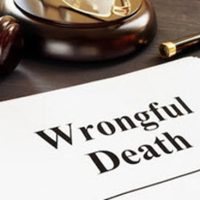What Are The Differences Between A Wrongful Death And Personal Injury Claim?

Severe accidents in Ohio, such as car accidents and motorcycle wrecks, can have devastating consequences. Vehicle occupants, motorists, and pedestrians can sustain debilitating and fatal injuries in these types of collisions. When an individual has sustained injuries, that person may be eligible to file a personal injury lawsuit against the liable party. Yet when a person suffers fatal injuries in a crash, or ultimately succumbs to injuries sustained in an accident, the law recognizes the complications of filing a claim. In such cases, the law allows another party to step into the shoes, metaphorically speaking, of the deceased in order to file a claim. This type of lawsuit is known as a wrongful death lawsuit.
Our Ohio wrongful death lawyers want to provide you with more information about the differences between wrongful death and personal injury lawsuits in the state.
Party Who Can File a Claim
In a personal injury lawsuit following a car accident or another kind of motor vehicle collision, the injured person is the party who can be eligible to file a lawsuit against the individual or entity responsible for the crash and any resulting injuries. To be clear, the person who has been injured will be the named plaintiff in a civil lawsuit.
However, when an accident results in a person’s death, that person cannot file a lawsuit on his or her own behalf any longer. Ohio wrongful death law allows the personal representative of the deceased’s estate to file a lawsuit against the liable party or parties. The statute defines a wrongful death as a death that “is caused by a wrongful act, neglect, or default which would have entitled the party injured to maintain an action and recover damages if death had not ensued.” While some states permit a surviving family member, such as a spouse or child, to file a wrongful death lawsuit, Ohio requires the personal representative to undertake this role.
Party Who Can Recover Damages
If a plaintiff is successful in a personal injury lawsuit, that plaintiff—the injured party—can be eligible to obtain damages. Contrarily, in a wrongful death lawsuit in Ohio, it is typically the surviving family members who can recover damages. Although the personal representative of the estate will file the wrongful death claim, a surviving spouse or child, for example, can recover damages.
In both personal injury and wrongful death lawsuits, damages can include both economic and non-economic damages, which are types of compensatory damages. Some additional compensatory damages may be awarded in a wrongful death lawsuit that would not be awarded in a personal injury case, such as compensation for loss of the deceased’s support or companionship, and funeral or burial expenses.
Statute of Limitations
While both personal injury and wrongful death lawsuits in Ohio have a two-year statute of limitations, the clock begins ticking at different points in time. In a personal injury lawsuit, with a few exceptions, the clock will begin ticking on the date of the accident. In a wrongful death case, the clock will begin ticking on the date of the deceased’s death.
Seek Advice from an Ohio Wrongful Death Attorney
If you have questions or need assistance with a wrongful death lawsuit, you should seek advice from an Ohio wrongful death lawyer at our firm. Contact Brian G. Miller Co., LLC today to learn more about how we can assist you.
Resource:
codes.ohio.gov/ohio-revised-code/section-2125.01


